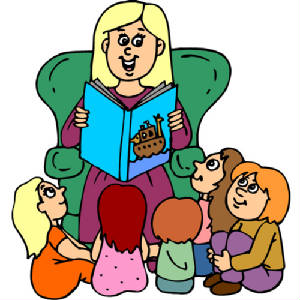Everyone loves a good story. In
days gone by, the storyteller of he tribe or village was a very important person. The
most exciting stories were handed down, to become the legends, myths and even history we know today.
You have many places to get good stories – your family, school, the
library, radio, television, movies, internet and from your own personal experiences.
Storytelling will help you to gain confidence and is a good way to entertain
your friends in Guiding.
Storytelling
In choosing a story to tell your friends at campfire, look for a tale that
is simple, easily told and one you yourself like. Some of the things to look
for in a story are:
ACTION - something happening, excitement, danger, adventure, conflict
CHARACTERS - the generous, brave, fair, heroic, noble hero types
ANIMALS - courageous, loyal pets, the wild animals, animal habits, animals in
war and peace
TRAVEL - to foreign countries, space, vacation, and exploration now and
in the past
HISTORY - ancestors, pioneers, explorers
FAIRY TALES - love, romance, good versus evil,
happy ending
HUMOUR - family, fun, group adventures, school humour
Where to Look for a Story
The natural place to look for a good story is your local library. Talk to the librarian, she will have many suggestions that will help you.
She will be able o show you books on such topics as – nature, animals, mysteries, folk tales, romance, sports,
current events, history to name a few.
A parable from the Bible can also be used as the basis for a good story
and possibly work into a current happening in the Unit.
Many good stories can be found in your daily newspaper, magazines and on
radio and television.
Use stories from personal experiences.
All girls have interesting things happen to them that would be of interest to others in your Unit. What about that vacation trip you took last year, your visit to the zoo, attendance at a professional
hockey or football game, the musical concert or theatrical play you attended? These
are only a few possibilities. Why not start your own list? Because personal experiences are true, they are special interest to others.
Don’t forget some of the stories that Walt Disney made famous. And don’t forget the myths and legends of ancient times, the stories of the
stars and history of your city, province and country.
How to Prepare a Story
· First, choose a story that you like and you think would be liked by the Unit who will be listening to you.
· Read it for the plot, general ideas, characters, and places.
· Make brief notes on a card or in a notebook of the important parts of the story.
· Read the story again to review the points listed above.
· Try to “live the story” as you read it.
· Have a good beginning and ending.
· Tell the story to yourself, aloud if possible.
· Tell the story to your family or a couple of friends to get their reaction.
How to Tell a Story
· Be sure that your audience is comfortable.
· Get their interest right away with your good opening.
· “Live the story” with your audience.
· Stick to your original plan.
· Speak clearly, naturally and slowly.
· Use gestures if you want to.
· You may want to try special voices for special characters.
· When you finish the story, stop talking!
Some Other Ideas
· Sing
Cumulative Story Songs (i.e., I Had a Rooster, There’s A Hole in the Bottom of the Sea, etc.)
· Sing Echo Songs (i.e., The Bear Hunt, The Bear Song, etc.)
· Use Participation Stories (i.e., The Birds of Many Songs, The Brutal
Miner, etc.)
· Round Stories – a very popular form of storytelling is a round story. A good storyteller leads off with a fast moving, exciting
story and then pointes to someone in the group who must carry on with the story. It means that everyone in the group must
be listening carefully and have a good imagination.
· Serial Stories – famous stories like “Gulliver’s Travels,” “The Jungle Book” and “Treasure
Island” can be told this way. Tell a part, possibly a couple of chapters, one week and then pick up the next part, the
following week. You and your friends may want to make a team effort of a serial story and each tells a part.
· A Story Game – this is a good game and gives everyone a chance to tell a story. Each girl starts to write a story at the top of a
piece of paper. After each has written two or three sentences, you call “STOP” and the girls fold their papers
and pass them on to the person on their left, who must not look at what was written. At “GO” everyone continues
to write two or three sentences, trying to be as funny as possible, folds the paper again and passes them on. This goes on
until all papers have been passed around the circle. The papers are then opened and read.
· Homemade Five Minute Yarns - how is your imagination? Make up and tell a story based on the following scenes.
Your story must include all the points mentioned.
|
Scene: Grandmother’s House
ð
Chiming clock
ð
Pond
ð
An announcer
ð
Kettle
ð
Ironing board
ð
hose |
Scene: A School Room
ð
A photograph
ð
Sack of coal
ð
Cushion
ð
Rocking chair
ð
Electric clock
ð
Football player |
|
Scene: Castle at Midnight
ð
Ashtray
ð
Vase
ð
Jewellery collector
ð
Burglar
ð
Black cat
ð
Desk lamp |
Scene: Deserted Road
ð
Flat tire
ð
Roast of beef
ð
Lame dog
ð
Locked gate
ð
Haystack
ð
Long-bearded hobo |
Use
your imagination to create many of your own five minute yarns. These make excellent stories for around the campfire.
Interactive
Stories - Here are some ideas:
Spinning a Yarn
· Before story time, unroll a ball of
yarn and cut it into different lengths to 1 to 1.5 m, at least one for each person. Roll up the yarn again, loosely.
· The leader starts the story, unrolling
the ball of yarn as she speaks. When she comes to the end of the first piece of yarn, she hands the ball to the next person,
who continues the tale as she unrolls the next piece of yarn. When she comes to the end of her piece, she passes the ball
to the next person, and so on.
Story Bag
Have a bag of small articles, one article for each person in the group. The leader starts
a story, and then at an interesting point, asks the person next to her to pick something out of the bag and continue the story,
somehow working the item she has chosen into the tale.
Surprise Stories
These stories provide active participation, plots that make no sense whatsoever, and lots
of laughter. The storyteller has the basic outline of the story prepared ahead of time but with blanks where vital information
is left out, for example:
“Once upon a time there was a __________ (type of person).
One morning she woke up feeling __________ (emotion)
So she decided to visit _________ (place).
When she got there, she met a __________ (person),
Who gave her a __________ (thing).
As she was studying her new gift, it suddenly began to __________ (action).
“Thank you!” she said to her new friend, and hurried home, __________ (action)
all the way.
From then on, she always felt __________ (emotion).
The listeners are divided into as many groups as there are blanks in the story (eight
in the example above). Blanks can be added or subtracted depending on the size of the group, and the story can be altered
to fit the circumstances (e.g., camp scene). Each group is asked to act out a different type of blank, in the order that they
appear in the story. For the story above, the order would be:
Group 1
a type of person or animal
Group 2
a feeling or emotion
Group 3
a place
Group 4
a type of person or animal (different from 1)
Group 5
any object
Group 6
any action
Group 7
any action (different from 6)
Group 8
a feeling or emotion (different from 2)
The groups are given a few minutes to prepare a dramatization of their words, and then
the story begins. When the teller comes to a blank in the story, she calls on the appropriate group to perform the surprise
word. The more ridiculous the tale becomes the better!
Minute
Mystery
Here are a couple ideas:
A Woman Comes Home From Shopping...
The Story You Tell:
(This one only works if you tell it
out loud, and it will greatly annoy people who are used to minute mysteries and have played them before!) A woman comes home
from shopping, puts all her purchases away, opens an envelope, and dyes (your listeners will hear "dies".) Why?
The Solution:
The woman wanted to dye an item of
clothing. She went to the store, bought powdered dye, and came home and dyed that item.
Sarah
Found Suffocating on the Floor...
The Story You Tell:
A man comes home to find broken
glass and water all over his living room, Sarah suffocating on the floor, and Sam looking smug in a corner. What happened?
The Solution:
Sarah is a goldfish, and Sam is
a cat. Sam knocked the goldfish bowl over and it broke, leaving Sarah to suffocate on the floor.
The Lady
on the 50th Floor...
The Story You Tell:
There is a lady who lives on the
50th floor of an apartment building. Every day she likes to go shopping, so she takes the elevator all the way down to the
ground floor and heads out to shop. When she returns, she takes the elevator up to the 10th floor and then walks the rest
of the way to the 50th floor. On rainy days, she takes the elevator all the way to the top. Why?
The Solution:
The lady is very short. While
she can reach the ground floor button in the elevator, she sure can't reach the 50th floor button! On sunny days she can reach
the 10th floor button and has to walk the rest of the way up. On rainy days she carries an umbrella and uses it to reach the
50th floor button.
You Are Locked in a Metal Room...
The Story You Tell:
You are trapped in a solid metal room. There are no holes, no doors, no anything; just a table and a chainsaw. The
chainsaw won't cut through the metal. How do you get out?
The Solution:
Use
the chainsaw to cut the table in half. Because two halves make a (w)hole (horrible pun), you escape!


